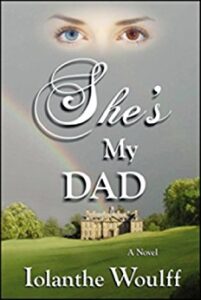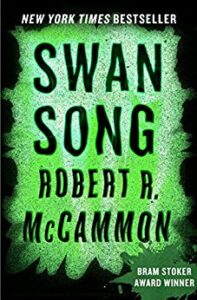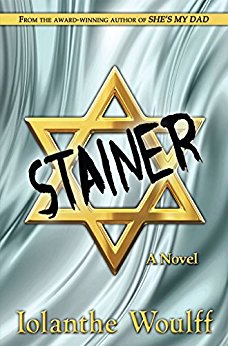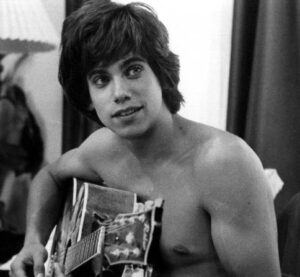STAINER received a 4+ star review, making it an IndieReader Approved title.
Following find an interview with author Iolanthe Woulff.
What is the name of the book and when was it published?
The title is “STAINER: A Novel of the ‘Me’ Decade”, published on May 30th, 2017, although I finished the first draft in 1978. (In my Author’s Preface, I detail how the novel came to light after almost forty years in that famous “trunk”.)
What’s the book’s first line?
Here is the opening sentence:
“It is a poignant truth of our heedless youthful years, that the events and encounters of a single night can so alter the course of a young person’s life that it will be changed forever.”
What’s the book about? Give us the “pitch”.
Short version: “Spoiled Jewish college kid Ben Steiner goes off the rails in this lively coming-of-age tale set in 1970s New York.”
Jacket Blurb: “New York City, 1975: Decent-hearted but spoiled Jewish college kid Ben Steiner is naively possessed by an overwhelming desire to be cool. At a springtime party on the night of his twenty-first birthday, he meets two people: Rebecca Glaser, the longed-for sweet girl of his dreams, and P.T. Deighland, a beguilingly knavish wiseacre from Princeton. Seduced by Deighland’s cocksure irreverence while simultaneously succumbing to his own temptations, Ben makes a cascading series of unfortunate choices which not only threaten his budding relationship with Rebecca, but expose him to ruin at the hands of a ravishing but ruthless fashion model named Anthea Montague. Against the background of a vanished period in American history, STAINER offers a bittersweet nostalgic trip back to a less complex world, during a time of incautious excesses that, while deceptively fun and carefree, in due course forced many unwary youngsters like Benjamin Steiner to learn some necessary –albeit painful– lessons about growing up.”
What inspired you to write the book? A particular person? An event?
Since I wrote the book four decades ago, I must confess that I cannot precisely recollect what the initial idea was. I just sat down and started scribbling (longhand, on legal yellow sheets) and eventually the novel emerged. But now that I think of it, I did nurse an admittedly puerile desire to vengefully skewer a “particular person”, as you say, and decided that the cleverest way to accomplish that would be to portray them as a thoroughly rotten character in a book. So I did; and no, I won’t tell you which character, but suffice it to say that nowadays my intended skeweree is rich, fulfilled, aging much better than I am, and blissfully unaware of my –or my novel’s– existence. Which, all things considered, is exactly as it should be.
What’s the main reason someone should really read this book?
“Should” is a word I never apply to anyone but myself. My hope is that readers will be able to relate in some way to my story while finding it entertaining, plausible, funny and/or sad, and somewhat less shallow than a mud puddle (without being preachy.)
What’s the most distinctive thing about the main character?
The fact that he is distinctly ordinary. Yes, he’s an observant Jew, goes to an Ivy League college, and comes from a well-to-do background; but setting these aside, Benjamin Steiner is essentially an unremarkable young fellow. Actually, it is Ben’s uneasy dissatisfaction with his own unremarkableness that leads him to make the heedless decisions which will upend his life.
Who -real or fictional- would you say the character reminds you of?
Hard to say. When I started to write the novel, my initial notion was to model Benjamin on a boringly conventional –colorless– childhood friend of mine. But that quickly faded, and Ben’s persona eventually coalesced into a mélange of character traits drawn from many different people… including me.
If they made your book into a movie, who would you like to see play the main character(s)?
When I wrote the novel back in the late seventies, I knew precisely who I wanted: A young actor named Robbie Benson for Benjamin, and a soap opera star named Grant Aleksander for P.T. Deighland. I thought that Benson could readily convey Ben’s mix of schoolboy arrogance and naiveté, while Aleksander had exactly the right look for Deighland’s snide elitism. Of course, they are both far too old at this point, and since I’m not up on the current crop of young actors, I’m at a loss to offer any suggestions.
When did you first decide to become an author?
I don’t believe I ever did; at least, not in any conscious way. I just started writing, and eventually novels happened, which made me an “author”… I suppose. Frankly, to this day I find the title embarrassingly ostentatious. I much prefer “storyteller”.
Is this the first book you’ve written?
Yes, but as I mentioned previously, I wrote STAINER forty years ago. My first published novel was SHE’S MY DAD, which came out in 2009.
What do you do for work when you’re not writing?
Whatever I please. (Okay, that’s a bit flippant, but essentially true; I’m past retirement age.)

Never enough. I’m terrible at self-discipline, and can be distracted by pretty much anything: food, television, Internet, the cat, etcetera. On the other hand, when I’m nearing the finish line of a novel, and begin to feel the denouement’s gravitational pull, I will write and write like a crazy person and become oblivious to everything else.
What’s the best and the hardest part of being an indie?
The best? That’s easy: Independence from bottomline-obsessed publishing/marketing suits who wouldn’t recognize good writing if it bit them on the hindquarters. The hardest part? See 11, above… and, holding yourself to the highest editorial standards so that whatever you produce is equal to, or better than, traditionally-published works. Anything less is an insult to the readers you’re hoping will buy your book.
What’s a great piece of advice that you can share with fellow indie authors?
With your permission, I’ll share three. First: If you own any “How-to-Write” books –and I sincerely hope you don’t– immediately throw them into the incinerator. Second: Read, read, READ! Classics, contemporary, everything. That’s how you learn to write… assuming you have the gift. (If you don’t, go become an astronaut or something.) Third: When you start a project, DON’T re-read anything you’ve written until you have amassed at least fifty pages, lest you fall into the endless-loop editing trap. (Been there, done that.)
Would you go traditional if a publisher came calling? If so, why?
Well, anyone with a lick of sense never says “never”; still, I can’t really see why I would. The days when so-called ‘traditional’ publishers were the only ones who could confer literary legitimacy are dead and gone, never to return. Naturally the industry mossbacks still cling to their antediluvian view that when it comes to publishing, ‘indie’ equates to ‘vanity’… which rather reminds me of dinosaurs gazing placidly upwards at a strange new star growing brighter by the moment.
Is there something in particular that motivates you (fame? fortune? sex?)
Uh… none of the above. But like I said earlier, I really like telling stories. When people enjoy them, that’s more than enough reward for me.

Impossible to choose just one, so… Charles Dickens and Mark Twain.
Which book do you wish you could have written?
SWAN SONG, by Robert R. McCammon. Although I could never write one, I’m a fan of post-apocalyptic fiction, and this huge novel simply blows me away no matter how often I read it.


